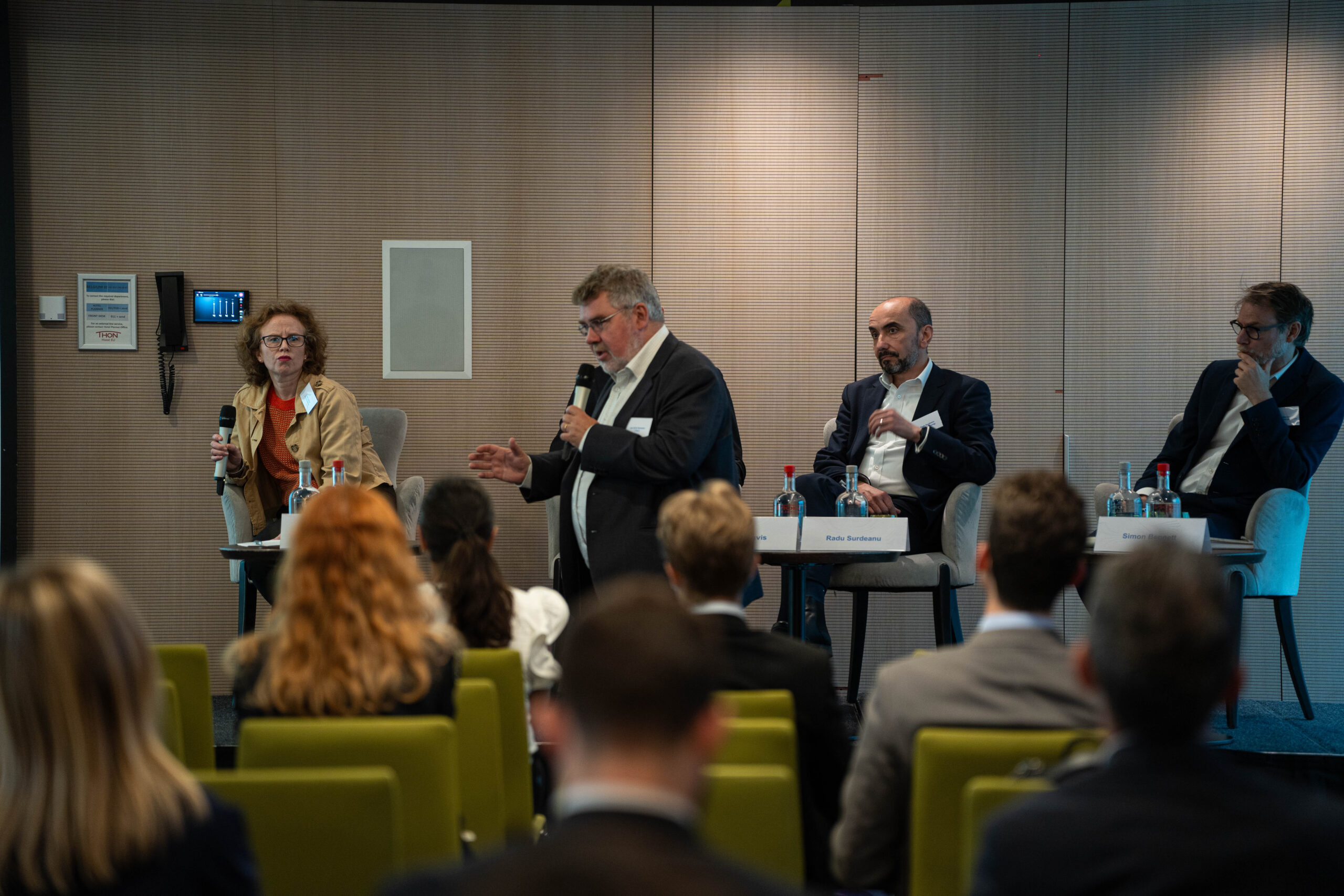Four Coordination and Support Actions (CSAs) funded under the topic HORIZON-CL5- 2023-D2-01-07: ‘Support for the deployment of R&I results for climate mitigation. Synergies with the ETS Innovation Fund’ organised a public conference “Unlocking Low-Carbon Innovation: From Horizon Projects to Market Deployment” on 20 May in Brussels.
Jose Jimenez Mingo (European Commission) kicked off the event by presenting the day’s agenda and the event’s objectives. He emphasised that European competitiveness was at risk and that the event was an opportunity to discuss how to improve the deployment of innovative technologies and to explore different possibilities to fund these technologies, using the Innovation Fund and other programmes.
Maria Velkova (European Commission) delivered a keynote speech, covering the topics of sustainability, climate action, and competitiveness. She highlighted the importance of reaching the energy transition through a sustainable economy and resilience, and securing raw materials. She added that the European Commission aims to close the innovation gap by developing a joint roadmap for decarbonisation and competitiveness, reducing dependencies and increasing security. In addition, she mentioned the creation of an industrial decarbonisation bank, which will pull different sources together for Member States. Her speech ended with the latest 2024 Innovation Fund call results and a focus on auctions.
The first session focused on the required elements for successful Innovation Fund applications and was moderated by Andrea Rausa (Ciaotech/LEADS project). David Garcia Arrate (Euro-Funding/REALIZE project) made a presentation on the technical and operational maturity, emphasising that a balance between the degree of innovation and the technological maturity needs to be found to show the evaluator that results can be reached. A technical risk analysis and mitigation measures also need to be done. Federico Spadaro (CLERENS/H2IF project) presented the financial maturity and showcased some reasons for failure, such as the credibility of the business model and financing plan, the strategy to secure contracts with external stakeholders, and the cash flow projections. Maria Velkova shared a few slides to compare different aspects from the point of view of the European Commission: the importance of revenues, consistency of information, lack of evidence, issues with the financing plan, commitment of shareholders, credible data and evidence, detailed strategies to achieve targets, the team management and organisation.

Copyright Mirko Paradiso
The event’s second session gave the floor to industry representatives and was moderated by Philip Hawkins (European Commission). Kristian Aas (SINTEF/2DPLOY project) started the session with a presentation of the innovation pipeline developed by the CSAs in their respective sectors and the collaboration to be strengthened between the projects to understand the gap between R&D Horizon projects and how they can reach industrialisation. Athanase Vafeas (Dowel Innovation/H2IF project) shared the journey of STORENGY, a company having the ambition to become the leader of renewable gases in Europe. Heidi Fuglum (TIDETEC/REALIZE project) highlighted the opportunities and challenges that the company has faced. Fredericq Peigneux (Heidelberg Materials – ANTHEMIS) presented the challenges faced in the carbon capture sector. The session ended with a Q&A with the audience.
The CSAs organised four breakout sessions in their sectors (renewable energy, hydrogen and energy storage, CCUS, energy intensive industries). The breakout session on renewables, moderated by Jan Erik Hanssen (1-Tech/REALIZE project), included a presentation of Pedro Mayorga (EnerOcean/REALIZE project) who shared his experience as a project promoter in the REALIZE project. This session was also the opportunity to emphasise the missing link between Horizon projects and the Innovation Fund.

Copyright Mirko Paradiso
A panel discussion on complementary funding opportunities was organised at the end of the conference and moderated by Marie Latour (Euro-Funding/REALIZE project). Radu Surdeanu (Siemens Energy) shared examples of projects that coupled the Innovation Fund with state aid. Simon Bennett (IEA) presented the report on The State of Energy Innovation and how the IF has made a difference to support European research and development and how China has become the world’s number one country for clean energy and low carbon energy patents. Ruben Davis (Cleantech for Europe) mentioned that scale-ups have either raised debt or grant support and most have failed to apply to the IF. He added that there is a scaling problem in Europe, especially for scale-ups that can’t hire consultants and cannot secure grants. He mentioned the Hydrogen bank as another source of funding. Finally, the panellists emphasized the importance of knowledge sharing and having public data available on what is working and not working in Innovation Fund applications, as well as looking around the world to see how other non-EU countries support innovation and create funding programs.

Copyright Mirko Paradiso
Maria Velkova (European Commission) closed the event by reminding recommendations that have been discussed throughout the day and the additional funding instruments such as the EIB, the European Investment Fund and the EIC Accelerator. She added that the Project Development Assistance, the Strategic Technologies for Europe Platform and national contact points, regional programmes can also be useful for projects and companies. She also indicated that a survey on the Innovation Fund will be launched, with a stakeholder consultation on 27 June.

Copyright Mirko Paradiso
The presentations of the event are available here. The after-event video is available here.



